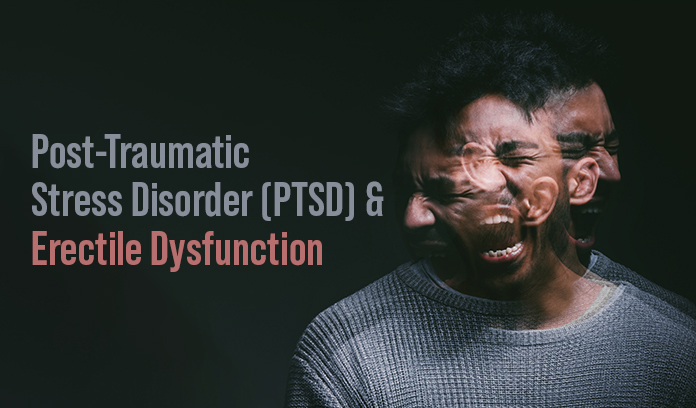Life’s journey often surprises us with unexpected challenges, and sometimes, two seemingly unrelated issues can be intertwined, creating a unique set of challenges.
Such is the case when Post-Traumatic Stress Disorder (PTSD) and Erectile Dysfunction (ED) converge, affecting individuals and partners both.
Facing these challenges requires holistic approaches that focus on open communication, empathy, and seeking healing together.
Understanding PTSD and ED
Post-traumatic stress disorder, or PTSD, is a psychological disorder that can be developed by a terrifying event that is scary, dangerous, or shocking, either experiencing it or witnessing it.
PTSD, typically triggered by traumatic events can manifest in many forms, including flashbacks, nightmares, and anxiety.
On the other hand, ED is a condition associated with the inability to achieve or sustain an erection firm enough for satisfying sexual intercourse. Some of the emotional side effects of PTSD that can result in ED include anxiety, stress, depression, and diminished sexual desire.
The Interplay and Challenges
Partners may face many emotional and physical hurdles when PTSD and ED intersect. The fear of triggering traumatic memories during the time of sexual intimacy can result in avoidance of physical contact, affecting the connection between the partners.
Moreover, the guilt and frustration associated with ED can exacerbate the symptoms of PTSD, creating a whirlwind of emotional distress.
Seeking Healing Together
- Open Communication: Communication is the first step towards maintaining any healthy relationship. Partners are advised to openly discuss their fears, concerns, and struggles. By indulging in open communications, partners can understand each other better and work towards mutual support.
- Professional Help: Seeking guidance from a therapist experienced in both PTSD and sexual health is essential. Therapists can help individuals manage the emotional aftermath of trauma while also understanding the physical aspects of ED and providing proper treatment options.
- Patience: Healing takes time. Both partners need to understand each other and the process. The progress might be slow but every step forward is a victory.
- Exploring Intimacy: Couples can take part in an alternative form of intimacy that focus on emotional connection rather than solely on physical satisfaction. This can result in a stronger bond and alleviate the pressure of performance.
- Healthy Lifestyle: Healthy lifestyle adjustments can positively impact PTSD and ED. Indulging in activities such as regular exercise, a healthy balanced diet and stress reduction techniques like yoga and meditation can improve overall well-being.
- Medication and Therapies: Depending on the individual’s requirements and needs, medical intervention such as medication or therapies like Cognitive Behavioral Therapy (CBT) may be advised. These can address both the emotional and physical aspects of the challenges. Know more about Natural Remedies for Treating Erectile Dysfunction.
Conclusion
Coping with the challenges of Post-Traumatic Disorder and Erectile dysfunction requires compassion, understanding, and mutual support from both partners. Acknowledging the challenges and seeking healing together strengthens your bond and overcome these hurdles. With open communication, professional guidance, and patience, the path toward healing becomes a shared endeavor that leads to growth, resilience, and a renewed sense of intimacy.

